
漢德百科全書 | 汉德百科全书
 Education and Research
Education and Research



 Medical, Pharmaceutical, Rehabilitation
Medical, Pharmaceutical, Rehabilitation
 Medical colleges/Research Institute
Medical colleges/Research Institute
 Nobel prize
Nobel prize
 Nobel Prize in Physiology or Medicine
Nobel Prize in Physiology or Medicine
 Nobel prize
Nobel prize
 University/Institute
University/Institute

 *Double First-rate
*Double First-rate
 A-class
A-class
 *Double First-rate
*Double First-rate
 Fachlicher orientierter Aufbau
Fachlicher orientierter Aufbau
 Beijing Shi-BJ
Beijing Shi-BJ

 Education and Research
Education and Research
 Open Resources for Education
Open Resources for Education
 Ministry of Education
Ministry of Education
 China
China
 National Key Laboratory of Science and Technology on Micro/Nano Fabrication
National Key Laboratory of Science and Technology on Micro/Nano Fabrication
 State key laboratory
State key laboratory
 State Key Joint Laboratory of Environmental Simulation and Pollution Control
State Key Joint Laboratory of Environmental Simulation and Pollution Control
 State Key Laboratory of Advanced Optical Communication Systems and Networks
State Key Laboratory of Advanced Optical Communication Systems and Networks
 State Key Laboratory of Biomembrane and Membrane Biotechnology
State Key Laboratory of Biomembrane and Membrane Biotechnology
 State Key Laboratory of Chemical Engineering
State Key Laboratory of Chemical Engineering
 State Key Laboratory of Nuclear Physics and Technology
State Key Laboratory of Nuclear Physics and Technology
 State Key Laboratory of Protein Engineering and Plant Genetic Engineering
State Key Laboratory of Protein Engineering and Plant Genetic Engineering

 Science and technology
Science and technology
 *World famous research institutions
*World famous research institutions
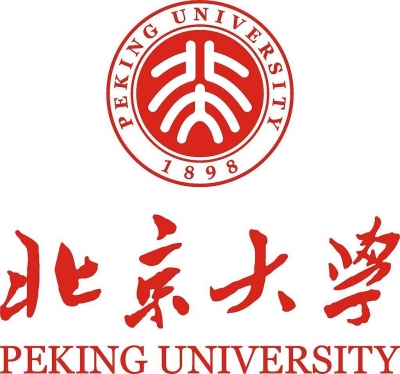


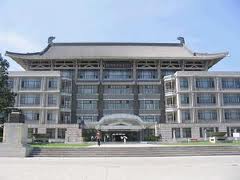
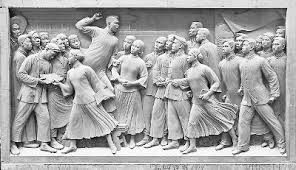
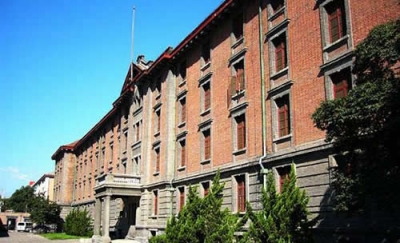
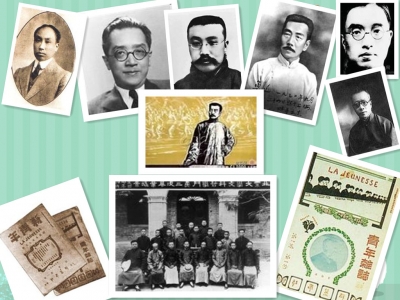
Die Universität Peking (auch: „Peking-Universität“; chinesisch 北京大學 / 北京大学, Pinyin Běijīng Dàxué, englisch: Peking University), kurz Beida (北大, Běidà), ist eine der renommiertesten Universitäten der Volksrepublik China. Die Beida wird von Chinesen gerne als das chinesische Harvard bezeichnet. Sie liegt im Nordwesten von Peking im Stadtbezirk Haidian, unweit des Alten Sommerpalastes und in unmittelbarer Nähe der ebenfalls hoch angesehenen Tsinghua-Universität.
北京大学(英语:Peking University,缩写:PKU)[注 1],简称北大[注 2],创建于1898年,初名京师大学堂,成立之初为中国最高学府,同时也是国家最高教育行政机关,行使教育部职能,统管全国教育。中华民国建立后,校名改为北京大学校,后又改名为国立北京大学。1916年—1927年,蔡元培任北京大学校长时期,“循思想自由原则、取兼容并包之义”,推行改革,把北大办成以文、理两科为重点的综合性大学,使北京大学成为新文化运动的中心、五四运动的策源地。1937年抗日战争爆发后,北大与清华、南开合并组建国立西南联合大学。日本战败后,北京大学回到北平复校。1952年院系调整后,北京大学聚集了原北大、清华、燕大三校的自然科学、人文学者,奠定了北大文理学科在中国高校中长期领先的地位。2000年,北京医科大学回归北京大学,成为北京大学医学部。如今,北京大学是一所兼具自然科学、人文学科、社会科学、医学以及新型工科的综合性大学,也是大中华地区和亚太地区综合实力最强的高等教育机构之一。北京大学现有六个校区。北京大学校址原本在沙滩红楼、公主府等地,1952年院系调整后迁入位于北京西北郊的原燕京大学校园(燕园),燕园兼收中国古典韵味和西方校园规划理念,主要景观有未名湖、博雅塔等。
北京大学(ペキンだいがく、ピンイン:Běijīng Dàxué、英名:Peking University)は、北京市海淀区に所在する中華人民共和国の国立大学である。1898年に創立された。大学の略称は北大(ベイダァ)。 国家重点大学及び副部級大学のひとつであり、中国の近代化に大きな影響を与えてきた。大学評価の世界的指標であるタイムズ・ハイアー・エデュケーションによる「THE世界大学ランキング 2017-2018」では中国大陸最上位の27位である[2]。 また、留学生が本科生に入学する際には入学試験が課せられるが、HSKの要求スコアが他の大学よりも高い。 周辺(離宮の敷地内)には頤和園や円明園などの歴史史跡が数多く残されてあり、「中国のシリコンバレー」と呼ばれる中関村も隣接している。
Peking University (Chinese: 北京大学, informally Beida 北大, PKU; lit. "Beijing University"), is a major research university in Beijing, China, and a member of the elite C9 League of Chinese universities.[5] Peking University was established as the Imperial University of Peking in 1898 when it received its first royal charter by the Guangxu Emperor. A successor of the older Guozijian Imperial College,[6] the university's romanized name 'Peking' retains the older transliteration of 'Beijing' that has been superseded in most other contexts.[7] Perennially ranked as one of the top academic institutions in China and the world,[8][9] as of 2021, PKU is ranked 2nd in the Asia-Pacific and emerging countries, and 23rd in the world by Times Higher Education.[10][11][12]
Throughout its history, PKU has had an important role "at the center of major intellectual movements" in China.[13] Abolished of its status as a royal institution after the fall of the Qing dynasty and the Xinhai Revolution; from the early 1920s, the university became a center for China's emerging, progressive, and republican movements. Faculty and students held important roles in originating the New Culture Movement, the May Fourth Movement protests, and other significant cultural and sociopolitical events, to the extent that the university's history has been closely tied to that of modern China. Peking University has educated and hosted many prominent modern Chinese figures, including Mao Zedong, Lu Xun, Gu Hongming, Hu Shih, Mao Dun, Li Dazhao, Chen Duxiu, and current Premier Li Keqiang.[14]
Peking University's library is one of the largest libraries in the world, containing over 8 million volumes.[15] The university also operates the PKU Hall, a professional performing arts center, and the Arthur M. Sackler Museum of Arts and Archaeology. PKU is also renowned for its campus grounds and the beauty of its traditional Chinese architecture.[16][17][18][19] Additionally, it hosts one of the only undergraduate liberal arts colleges in Asia, and is a Class A institution under the Chinese Double First Class University program.[20] Peking University's alumni and staff include 76 members of the Chinese Academy of Sciences, 19 members of the Chinese Academy of Engineering and 25 members of the World Academy of Sciences.[21]
L'université de Pékin (chinois simplifié : 北京大学 ; chinois traditionnel : 北京大學; pinyin : Běijīng Dàxué), est une université chinoise, considérée comme une des plus prestigieuses de la République populaire de Chine, connue dans le langage courant sous le nom de Beida (北大, Běidà), a été fondée à Pékin en 1898.
L'Università di Pechino (Běijīng Dàxué北京大學T, 北京大学S), comunemente conosciuta in cinese come Beida (北大), venne fondata con il nome di Università Imperiale della capitale nel 1898 in sostituzione dell'antica Guozijian (guózǐjiàn, 国子监). È un'importante università di ricerca della capitale cinese ed è la prima moderna e nazionale della Cina.
La Universidad de Pekín1 (abbreviada PKU, conocida coloquialmente en Chino Mandarín como Beida) es una universidad enfocada a la investigación localizada en Pekín, China y es miembro de la liga C9 de universidades de elite Chinas.2 Es la primera institución de educación moderna establecida en China y fue fundada durante los finales de la Dinastía Qing en 1898 con el nombre de Universidad Imperial de Pekín siendo la institución sucesora del Guozijian (Colegio imperial).3
Es una de las universidades más prestigiosas de la República Popular de China y de toda Asia, con un espíritu humanista de la investigación y la educación académica. Se disputa constantemente el sitial de mejor universidad de China con la Universidad de Tsinghua 4 y el 2019 fue nombrada la universidad número 22 de todo el mundo.5 Se encuentra en Pekín, la capital de China, cerca del Palacio de Verano, el campus de la universidad es llamado Yan Yuan, posee una extensión de 3 millones de metros cuadrados y es considerado uno de los más bellos de todo el continente asiático. 6 Actualmente la universidad cuenta con 30.000 estudiantes entre estudiantes de título de grado o licenciatura universitaria, estudiantes de postgrado, doctorado y estudiantes visitantes e internacionales. Todos ellos acuden a las 31 escuelas, 5 facultades y 271 centros de investigación que conforman la universidad, además mantienen relaciones con 200 instituciones internacionales en materia de colaboración e intercambio académico un aspecto importante para la educación china.
A lo largo de la historia, la Universidad de Pekín ha jugado un importante rol como centro de movimientos intelectuales de China. En la década de 1920, la universidad se convirtió en epicentro de los movimientos progresistas del país. Estudiantes, docentes y administrativos tuvieron importantes roles en los orígenes del Movimiento del Cuatro de Mayo, así como en otros eventos sociopolíticos a lo largo del siglo XX. Por estos motivos la historia de esta universidad esta profundamente asociada con la historia de la China moderna. La universidad de Pekín ha educado y acogido en su campus a muchas de las más prominentes personalidades chinas, incluyendo a Mao Zedong, Lu Xun, Gu Hongming, Hu Shih, Mao Dun, Li Dazhao, Chen Duxiu, y el actual premier Li Keqiang.
La Universidad de Pekín cuenta con una destacada biblioteca, la cual se fundó en 1902, pocos años después de la puesta en marcha de la universidad y dispone de más de 4.000.000 de volúmenes, con una capacidad de más de 6.500.000 volúmenes. Su colección de rarezas y libros antiguos es una referencia en toda Asia.
Su longevidad, de 114 años, y su rol predominante en la educación y en la política chinas durante su desarrollo dentro de las primeras décadas del siglo XX han convertido, entre otras razones, a esta universidad en una de las instituciones de educación superior más prestigiosas y exigentes de la República Popular China.
Пеки́нский университе́т (кит. трад. 北京大學, упр. 北京大学, пиньинь Běijīng Dàxué, палл. Бэйцзин дасюэ), известный также под сокращённым названием «Бэйда» 北大 — основанный в 1898 году, крупнейший университет Китая, один из старейших вузов страны.









 *Double First-rate
*Double First-rate
 A-class
A-class
 *Double First-rate
*Double First-rate
 Fachlicher orientierter Aufbau
Fachlicher orientierter Aufbau
 Beijing Shi-BJ
Beijing Shi-BJ

 Education and Research
Education and Research
 *Double First-rate
*Double First-rate
 Ministerium für Informationsindustrie
Ministerium für Informationsindustrie
 State key laboratory
State key laboratory
 State Key Laboratory of Software Development Environment
State Key Laboratory of Software Development Environment
 State Key Laboratory of Virtual Reality Technology and Systems
State Key Laboratory of Virtual Reality Technology and Systems

Im Jahre 1952 wurde in Beijing eine Luftfahrthochschule gegründet. Dazu wurden Luftfahrtinstitute aus acht bekannten chinesischen Universitäten wie der Qinghua- und der Beiyang-Universität zusammengefügt. Die Luftfahrthochschule existierte als solche, bis sie 1988 zur Universität für Luft- und Raumfahrt umbenannt wurde. Diese Universität befindet sich heute in der High-Techzone Zhongguancun im Norden von Beijing. Gleich nebenan auf dem Unicampus befindet sich auch das staatliche Olympiazentrum.
 *Double First-rate
*Double First-rate
 Fachlicher orientierter Aufbau
Fachlicher orientierter Aufbau
 State key laboratory
State key laboratory
 State key laboratory of chemical resource engineering
State key laboratory of chemical resource engineering


 *Double First-rate
*Double First-rate
 Fachlicher orientierter Aufbau
Fachlicher orientierter Aufbau

 Education and Research
Education and Research
 Open Resources for Education
Open Resources for Education
 State key laboratory
State key laboratory
 State Key Lab of Rail Traffic Control & Safety
State Key Lab of Rail Traffic Control & Safety
